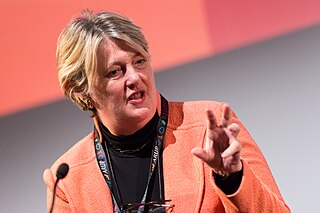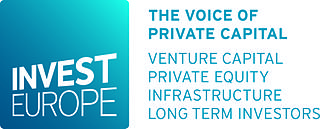Related Research Articles
The Carlyle Group Inc. is a multinational private equity, alternative asset management and financial services corporation based in the United States with $376 billion of assets under management. It specializes in private equity, real assets, and private credit. It is one of the largest mega-funds in the world. In 2015, Carlyle was the world's largest private equity firm by capital raised over the previous five years, according to the PEI 300 index. In the 2023 ranking however, it had slipped to fifth place.
In the field of finance, private equity (PE) is capital stock in a private company that does not offer stock to the general public. Private equity is offered instead to specialized investment funds and limited partnerships that take an active role in the management and structuring of the companies. In casual usage, "private equity" can refer to these investment firms rather than the companies that they invest in.

Venture capital (VC) is a form of private equity financing that is provided by firms or funds to startup, early-stage, and emerging companies that have been deemed to have high growth potential or which have demonstrated high growth. Venture capital firms or funds invest in these early-stage companies in exchange for equity, or an ownership stake. Venture capitalists take on the risk of financing risky start-ups in the hopes that some of the companies they support will become successful. Because startups face high uncertainty, VC investments have high rates of failure. The start-ups are usually based on an innovative technology or business model and they are usually from high technology industries, such as information technology (IT), clean technology or biotechnology.

TPG Inc., previously known as Texas Pacific Group and TPG Capital, is an American private equity firm based in Fort Worth, Texas. The firm is focused on leveraged buyouts and growth capital. TPG manages investment funds in growth capital, venture capital, public equity, and debt investments. The firm invests in a range of industries including consumer/retail, media and telecommunications, industrials, technology, travel, leisure, and health care.
A private equity fund is a collective investment scheme used for making investments in various equity securities according to one of the investment strategies associated with private equity. Private equity funds are typically limited partnerships with a fixed term of 10 years. At inception, institutional investors make an unfunded commitment to the limited partnership, which is then drawn over the term of the fund. From the investors' point of view, funds can be traditional or asymmetric.

Anne Margaret Glover, is CEO and co-founder of Amadeus Capital Partners, a venture capital firm that invests in European high-technology companies. Prior to founding Amadeus in 1997, she was with Apax Partners & Company Ventures, where she was a member of the investment team. She has been a business angel, investing in UK-based information technology start-ups. Glover worked for Virtuality Group plc, where she was COO of the virtual reality peripherals company.

Sir Ronald Mourad Cohen is an Egyptian-born British businessman and political figure. He is the chairman of The Portland Trust and Bridges Ventures. He has been described as "the father of British venture capital" and "the father of social investment".

Permira is a British global investment firm specialised in buyout, growth equity and credit funds. Founded in 1985 as part of Schroders, it became independent in 1996. Operating as Permira since 2001, the company became one of the largest buyout specialists. As of today, Permira advises funds with total committed capital of €77 billion, which have invested in more than 300 companies worldwide. The company employs over 470 people in 15 offices across Europe, North America and Asia.
In finance, the private-equity secondary market refers to the buying and selling of pre-existing investor commitments to private-equity and other alternative investment funds. Given the absence of established trading markets for these interests, the transfer of interests in private-equity funds as well as hedge funds can be more complex and labor-intensive.
Tim Hames was Director General of the British Private Equity and Venture Capital Association (BVCA). Before joining the BVCA, Hames was a columnist and Chief Leader Writer at The Times. He occasionally writes travel pieces. He also wrote for The Tablet and the Charleston Mercury. Before joining the Times in 1999, he was a lecturer in politics at Oxford University. He attended Oriel College, Oxford. He has a doctorate in philosophy (DPhil) from the University of Oxford.
Jeremy Coller is a British businessman and philanthropist. He is the founder, chief investment officer and chairman of Coller Capital.

Carried interest, or carry, in finance, is a share of the profits of an investment paid to the investment manager specifically in alternative investments. It is a performance fee, rewarding the manager for enhancing performance. Since these fees are generally not taxed as normal income, some believe that the structure unfairly takes advantage of favorable tax treatment, e.g. in the United States.

The history of private equity, venture capital, and the development of these asset classes has occurred through a series of boom-and-bust cycles since the middle of the 20th century. Within the broader private equity industry, two distinct sub-industries, leveraged buyouts and venture capital experienced growth along parallel, although interrelated tracks.
SVG Capital was a leading British private equity and investment management business. Headquartered in London, it was listed on the London Stock Exchange.

Private equity in the 1990s relates to one of the major periods in the history of private equity and venture capital. Within the broader private equity industry, two distinct sub-industries, leveraged buyouts and venture capital, experienced growth along parallel although interrelated tracks.

Private equity in the 2000s represents one of the major growth periods in the history of private equity and venture capital. Within the broader private equity industry, two distinct sub-industries, leveraged buyouts and venture capital expanded along parallel and interrelated tracks.
Impact investing refers to investments "made into companies, organizations, and funds with the intention to generate a measurable, beneficial social or environmental impact alongside a financial return". At its core, impact investing is about an alignment of an investor's beliefs and values with the allocation of capital to address social and/or environmental issues.
Paul Adrian Barlow Beecroft is a British venture capitalist based in London. He was for many years Chief Investment Officer of the private equity group Apax. He was until recently Chairman of Dawn Capital.

Invest Europe is a trade association representing Europe's private equity, venture capital and infrastructure sectors, as well as their investors.
Michele Giddens OBE is a leading figure in the social impact investment movement in the UK. She is chair of the UK National Advisory Board for Impact Investing. and co-founded Bridges Fund Management, a specialist sustainable and impact investment firm, alongside Philip Newborough and Sir Ronald Cohen, often described as "the father of British venture capital".
References
- ↑ Hosking, Patrick. "Private equity finds riches even beyond the land of milk and honey". The Times .
- ↑ Thomas, Helen (June 14, 2007). "Are we the only ones feeling sorry for the BVCA?". Financial Times.
- ↑ "Finalists for first ever Growth Investor Awards revealed". Professional Adviser. 21 July 2015. Retrieved 21 July 2015.
- ↑ "Side Letter: Northern Trust's PE ETF; Hong Kong's SPAC dreams; new BVCA chair". Private Equity International (magazine). April 4, 2022.
- ↑ Thomas, Daniel; Wiggins, Kaye (September 25, 2020). "Private equity-owned companies win access to UK emergency funds". Financial Times.
- ↑ "UK private equity outperforms pension funds". Startups (magazine). 24 June 2015. Retrieved 21 July 2015.
- ↑ "University of Oxford doubles exposure to private equity". Financial Times. 19 July 2015. Retrieved 21 July 2015.
- ↑ "Private equity turns to movie making in effort to repair bruised reputation". Private Equity News. 25 November 2021. Retrieved 25 May 2022.
- ↑ "Corporate Law Update 06 May 2022". Lexology. 6 May 2022. Retrieved 25 May 2022.
- ↑ "BVCA releases new responsible private equity guide". Environmental Finance. December 11, 2012.